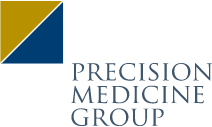First published in PM360

Launching Never Before Seen Products
With a PhD in Cell and Molecular Physiology, Nicole Ramocki thought she was destined for pharma bench research. However, despite receiving recognition for poster and oral presentations, she realized that day-to-day bench research was slower than she realized. She joined PRECISIONscientia and quickly accelerated to her sweet “speed-spot,” working as a launch expert on therapies never seen in the commercial space before.
For the first-of-its-kind, FDA-approved CAR T-cell therapy, Nicole and the team found themselves consulting on processes, as well as the launch. The therapy takes a patient’s own white blood cells and uses them to combat relapsed or refractory hematologic malignancies.
“We needed oncologists at each center who would champion this therapy, as our clients, healthcare professionals, and we were all working together to bring a truly innovative therapy to commercialization,” Nicole says. “These champions had to ensure all stakeholders were fully prepared to safely manage all aspects of this therapy. The work at each site involved creating many completely new processes, as this therapy is manufactured individually for each patient and the final product is not received through the pharmacy. We were constantly in a mode of learning and creating solutions to support all of the healthcare professionals and patients involved.”
PRECISIONscientia partnered closely with its clients to help bring the new therapy to the over 100 U.S. hospitals in which it is used today.
Nicole and the PRECISIONscientia team also hit the ground running for a novel FDA-approved oral treatment (in what was an injectable-only market) for people with relapsing multiple sclerosis. While it was easy to convince KOLs of the benefits of a pill versus an injection, vital safety concerns needed to be addressed, as the MS field was hyper-sensitive to safety based on a recent safety issue with another therapy on the market. So, Nicole and the team involved multidisciplinary experts to help MS specialists understand and monitor for safety issues that could affect their patients.
“With first-time therapies, it’s all new, so there are no wrong—or right—answers at first,” Nicole explains. “What drives us is that process of discovery, analyzing, testing, listening, and then starting again.”







